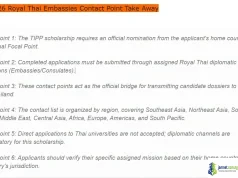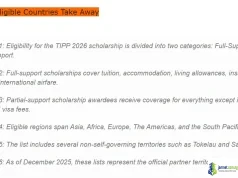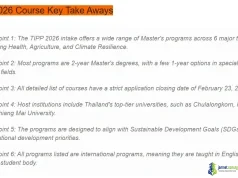A comprehensive guide to the revised Nigerian education curriculum, implemented in September 2025. Learn how this new, skills-based approach with trade subjects and digital literacy is empowering students and preparing them for the future workforce


Nigeria is taking a bold and necessary step to reform its education system with the introduction of a new national curriculum.

Join our Telegram Channel for Instant Scholarship Updates
This reform, spearheaded by the Federal Ministry of Education in collaboration with the Nigerian Educational Research and Development Council (NERDC), is a direct response to the need to equip students with the skills required to thrive in a rapidly changing global economy. Moving away from the traditional, content-heavy model, this new curriculum is designed to be more practical, skills-oriented, and relevant to the demands of the 21st century.
What Has Changed?
The new curriculum, set to be implemented from the 2025/2026 academic session, is a complete overhaul of the previous system. The primary goal is to shift the focus from rote memorization to competency-based and outcome-oriented learning. The changes affect every level of basic and secondary education, from Primary 1 through Senior Secondary School.
Key features of this reform include:
- Reduced Subject Load: One of the most significant changes is the drastic reduction in the number of subjects students are required to take. This is designed to alleviate the pressure on learners and give them more time to achieve mastery in core subjects. For example, Senior Secondary School students will now take 8-9 subjects, down from as many as 20 in the old system.
- Emphasis on Digital and Technological Skills: The curriculum now makes digital literacy and basic entrepreneurship compulsory for Junior Secondary School (JSS) students. At the Senior Secondary School (SSS) level, new subjects have been introduced, including programming, artificial intelligence, and new languages. This move is crucial for closing the digital skills gap and preparing students for a technology-driven world.
- Reintroduction of Nigerian History: Nigerian History is now a compulsory subject from Primary 1 to JSS 3. This is a vital step toward fostering a strong sense of national identity, heritage, and civic responsibility among young Nigerians.
- Introduction of Practical Trade Subjects: A major highlight is the introduction of several practical trade subjects. JSS students are now required to choose at least one trade subject from a streamlined list that includes Solar PV Installation and Maintenance, Fashion Design and Garment Making, Livestock Farming, and Computer Hardware and GSM Repairs.
How the New Curriculum Will Benefit Students
This new approach is poised to have a transformative impact on students, preparing them for both higher education and the modern workforce. The benefits are far-reaching and directly address some of the most pressing challenges facing Nigeria’s youth, particularly unemployment and a lack of practical skills.
1. Enhanced Employability and Entrepreneurship
By making trade and vocational subjects compulsory, the curriculum equips students with employable skills from a young age. Instead of graduating with only theoretical knowledge, students will have hands-on expertise in in-demand fields. This can help reduce the country’s high youth unemployment rate by enabling students to become either self-employed or more marketable to companies seeking skilled labor. The curriculum directly promotes a mindset of job creation rather than just job seeking.
For instance, a student who chooses Solar PV Installation and Maintenance will not just learn the theory behind renewable energy; they will learn how to physically install and maintain solar panels. Similarly, a student studying Fashion Design and Garment Making will be equipped with the skills to start their own clothing line or work in the fashion industry immediately after graduating. This practical training is a direct response to the demands of the modern workforce and positions students for immediate economic relevance.
2. Cultivating Critical Thinking and Problem-Solving
The shift to a competency-based model means students will be evaluated on their ability to apply knowledge, not just on their ability to recall facts. The focus on subjects like digital literacy, AI, and robotics encourages students to think critically, analyze complex problems, and develop innovative solutions. This is a fundamental change that nurtures creativity and prepares students to tackle real-world challenges.
This is a stark contrast to the old system, which often rewarded rote memorization over genuine understanding. The new curriculum’s emphasis on hands-on projects, case studies, and practical applications means students will learn by doing. For example, a student in a digital literacy class might be tasked with developing a simple app or a website, forcing them to solve real-world problems and collaborate with peers. This approach fosters a mindset of curiosity and resilience, which are essential skills for a dynamic, ever-changing world. To excel in this new system, students will need effective study habits and can benefit from techniques like the Pomodoro Technique, the Cornell Method, and the Interleaving study technique.
3. Promoting Global Competitiveness
The new curriculum aligns Nigeria’s education system with global standards. By integrating subjects like coding, AI, and data analysis, the reform ensures that Nigerian students are equipped with the same skills as their peers in other advanced nations. This makes them more competitive on the international stage, whether they choose to pursue higher education abroad or seek remote work opportunities.
Students interested in scholarships can learn how to apply for scholarships successfully, and those planning to move can get student accommodation tips. This blend of global relevance and local identity prepares students to be successful in any environment. The new curriculum serves as a passport to a global career by providing students with the tools and knowledge to succeed in the international job market.
4. Fostering Holistic Development
With a reduced subject load, students will have more time for in-depth learning and extracurricular activities. The curriculum’s emphasis on citizenship and heritage studies, alongside technical and digital skills, aims to create well-rounded individuals. It promotes a balance between academic knowledge, practical skills, and civic values, fostering a generation of responsible and productive citizens.
This holistic approach recognizes that education is not just about academics. It’s about developing the whole person. The inclusion of physical and health education, along with cultural and creative arts, ensures that students have a balanced educational experience. This can lead to reduced stress, improved mental well-being, and a more engaged student body.
Challenges and The Way Forward
While the new curriculum is a welcome and necessary reform, its success hinges on effective implementation. Key challenges that must be addressed include:
- Teacher Training: Teachers are the primary drivers of this change. They must be adequately trained and retrained to effectively teach the new, skills-based subjects, especially in technology and vocational areas. Without proper training, even the most well-designed curriculum can fail.
- Funding and Infrastructure: For a digital and skills-based curriculum to be successful, schools need reliable electricity, computers, internet connectivity, and well-equipped workshops. Insufficient funding and a lack of infrastructure, particularly in rural areas, could hinder the reform’s full potential. The government must make significant investments to ensure equitable access to these resources for all students.
- Mindset Change: There is a need for a societal shift in mindset to value vocational and technical skills as much as “white-collar” degrees. Parents, students, and the community must embrace the new approach to learning. This requires public awareness campaigns and a celebration of vocational excellence to change long-held perceptions about what constitutes a successful career.
Despite these challenges, the new Nigerian education curriculum represents a significant and hopeful step toward building a future-ready workforce and a more prosperous nation. By investing in its youth, Nigeria is not just reforming its schools; it is laying the foundation for a new era of innovation, entrepreneurship, and global relevance.
Frequently Asked Questions
1. When will the new curriculum be implemented? The new curriculum is scheduled for phased implementation starting from the 2025/2026 academic session.
2. What is the main objective of the new curriculum? The main objective is to shift from a content-heavy, rote learning model to a competency-based, skills-oriented system that better prepares students for the modern workforce.
3. How many subjects will a student take under the new system? Students at the Senior Secondary School level will now take a reduced number of subjects, typically between 8 and 9, to allow for greater mastery in core areas.
4. Are trade subjects compulsory? Yes, all Junior Secondary School students are required to choose and study at least one trade subject from a given list.
5. Why is Nigerian History a compulsory subject? Making Nigerian History compulsory is intended to instill a strong sense of national identity, heritage, and civic responsibility in young Nigerians.
6. Will this new curriculum affect university admission requirements? Admission requirements for universities will be updated to reflect the new subject combinations and a focus on competency-based learning. Students should check with their desired institutions for specific requirements.
7. How will teachers be prepared for the new curriculum? The government plans to implement comprehensive training and retraining programs for teachers to ensure they are equipped to teach the new skills-based subjects effectively.
8. What kind of digital skills will students learn? Students will be exposed to digital literacy, basic programming, artificial intelligence, and other technological subjects to close the digital skills gap.
9. How does this curriculum address youth unemployment? By making practical and vocational skills compulsory, the curriculum aims to equip students with the ability to either start their own businesses or be more marketable to employers, thereby addressing unemployment.
10. Is the new curriculum being implemented across all states at once? The implementation is designed to be phased, but it is a national policy that will be rolled out across schools in all states of the federation.













